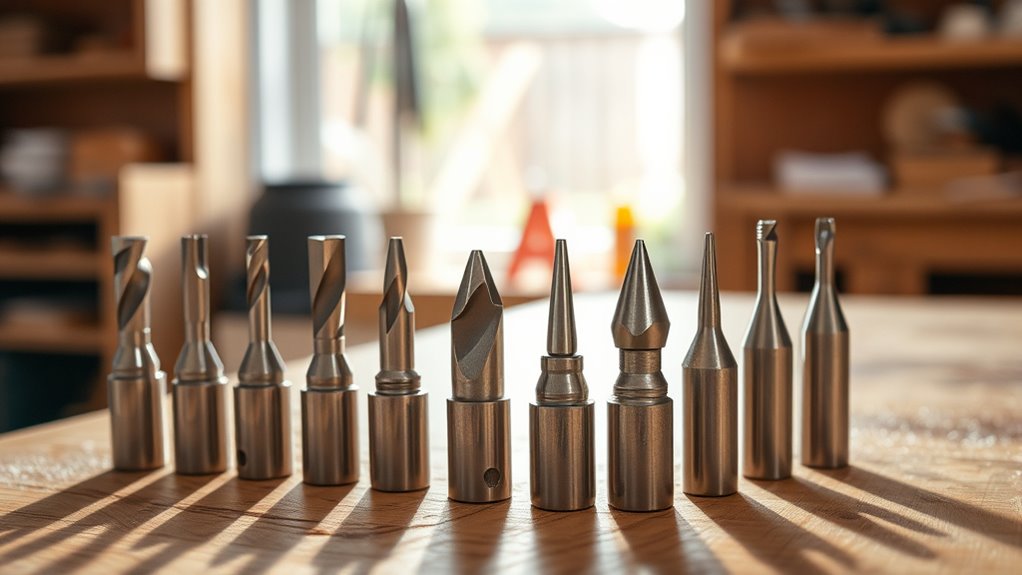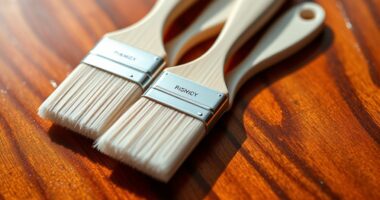When it comes to elevating my woodworking game, choosing the right router tools for edges has made all the difference. I swear by the KEENTECH Top Bearing Dish Carving Bit for clean cuts and decorative designs. The AVID POWER Compact Router offers great performance with its variable speeds. Plus, the BOSCH RA1054 Edge Guide helps with precision. Exploring more options, like the Pattern Flush Trim Bits and others, will give you an edge in your woodworking projects.
Key Takeaways
- Select router tools with ergonomic designs for comfortable handling and reduced strain during extended woodworking sessions.
- Consider routers with variable speed settings to enhance control and adapt to various cutting tasks effectively.
- Invest in high-quality router bits, such as carbide-tipped options, for smoother cuts and increased durability on hardwoods.
- Look for models with effective dust management systems to maintain a clean workspace and improve visibility during projects.
- Evaluate the weight and portability of routers to ensure ease of transport and maneuverability in different project environments.
KEENTECH Top Bearing Dish Carving Bit for Edge Forming
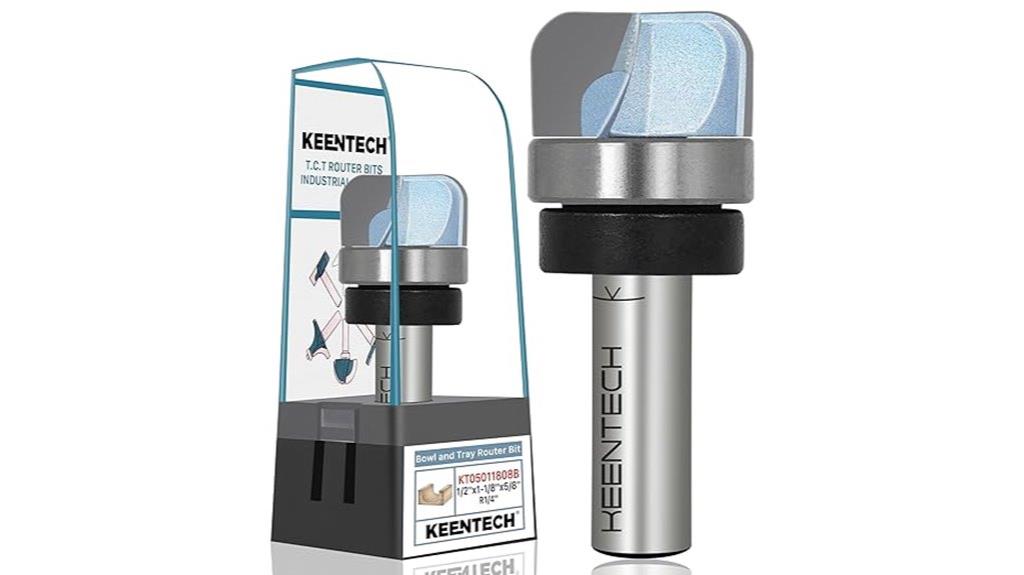
If you’re a hobbyist or an occasional woodworker looking for a reliable tool, the KEENTECH Top Bearing Dish Carving Bit for Edge Forming is a fantastic choice. With its 1/4 inch radius and 1/2 inch shank, it fits most routers perfectly. I love how it crafts clean cuts, needing minimal sanding afterward. It works wonders on wood, plastic, and even soft metals, making it versatile for various projects. I’ve used it for decorative carvings on furniture and channels in cutting boards, and it performs exceptionally well. Plus, it’s budget-friendly—definitely worth considering for your next woodworking adventure!
Best For: Hobbyists and occasional woodworkers looking for a reliable and budget-friendly carving bit.
Pros:
- Crafted from high-quality materials for durability and long-lasting performance.
- Leaves clean cuts with minimal sanding required, enhancing project efficiency.
- Versatile for use on wood, plastic, and soft metals, suitable for various applications.
Cons:
- May dull with heavy daily use, not ideal for frequent professionals.
- Performance might vary with different router models, requiring compatibility checks.
- Best suited for light users, potentially less effective for extensive projects.
AVID POWER Compact Router Tools for Woodworking
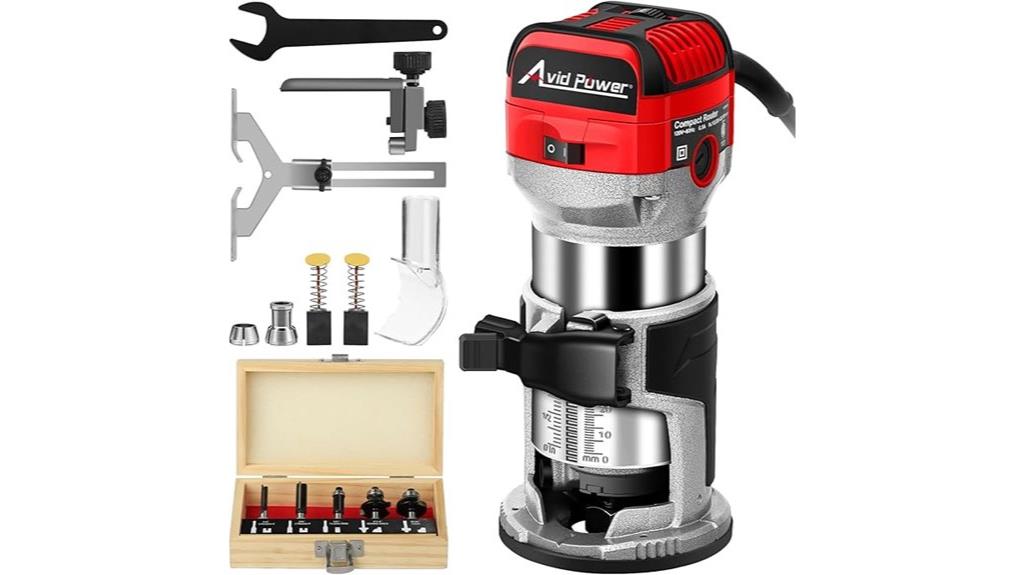
The AVID POWER 6.5 Amp Compact Router is perfect for DIY enthusiasts and hobbyists seeking a reliable tool for woodworking projects. Weighing just 4.41 pounds, it’s lightweight yet powerful, with a 1.25 HP motor and variable speeds up to 32,000 RPM. I love the ergonomic rubber-covered handle, which makes it comfortable to use for extended periods. The smooth depth adjustment and quick locking system enhance precision. Plus, with included accessories like router bits and an edge guide, it’s an excellent value. Just watch out for speed oscillation at low settings—understanding this helps me achieve the best results.
Best For: DIY enthusiasts and hobbyists looking for a lightweight and powerful compact router for woodworking projects.
Pros:
- Ergonomic rubber-covered handle for comfortable extended use.
- Variable speed control for tailored routing and trimming tasks.
- Includes useful accessories like router bits and an edge guide, offering great value.
Cons:
- Speed oscillation can occur at low settings, affecting performance.
- Difficulty in fine-tuning height adjustments for router tables.
- Potential for overheating during prolonged usage.
Compact 800W Wood Palm Router Tool for Woodworking
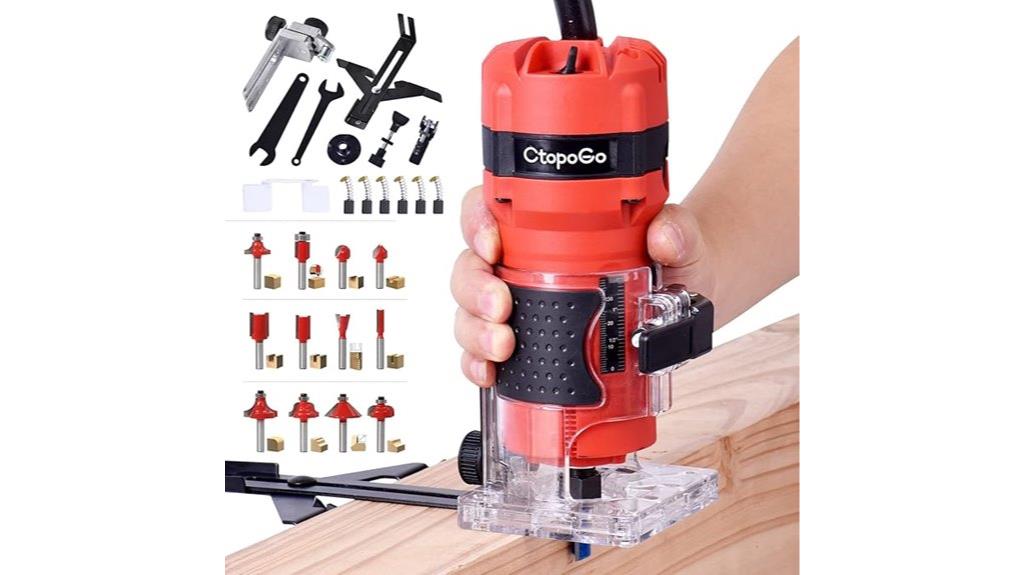
For anyone tackling light to moderate woodworking projects, the Compact 800W Wood Palm Router Tool stands out as an excellent choice. Weighing just 5.52 pounds, its compact design makes it easy to maneuver, whether I’m grooving or trimming. With 800 watts of power and a transparent base for visibility, it delivers precision with every cut. The included 12 router bits allow for versatility, helping me tackle various DIY tasks. While some users mention durability concerns, I find it offers great value for beginners. Overall, it’s a reliable tool that enhances my woodworking experience.
Best For: Beginners and hobbyists looking for a reliable and versatile router tool for light to moderate woodworking projects.
Pros:
- Easy to maneuver due to its compact design and lightweight.
- Comes with 12 versatile router bits for a variety of DIY tasks.
- Transparent base enhances visibility for precise cuts.
Cons:
- Some users report durability issues, particularly with power and carbon brushes.
- Included bits may not meet everyone’s expectations in terms of quality.
- Instructions for use could be clearer, leading to potential confusion.
Pattern Flush Trim Router Bits Set (1/4 Shank)
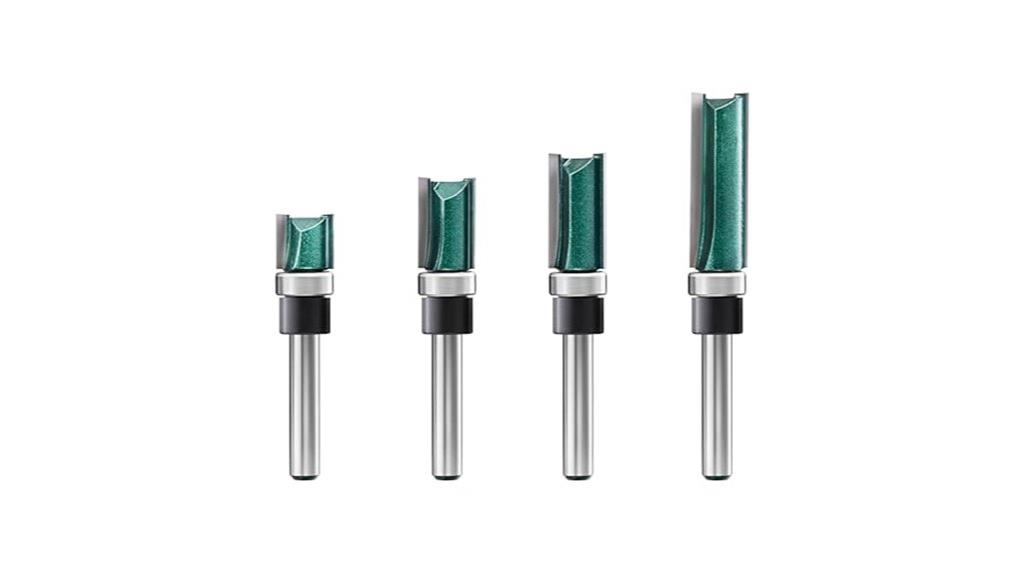
Whether you’re a weekend warrior tackling DIY projects or an amateur woodworker honing your skills, the Pattern Flush Trim Router Bits Set (1/4 Shank) stands out as a versatile tool in your arsenal. This set includes bits ranging from 1/2″ to 1-1/2″, perfect for flush trimming, pattern cutting, and more. I’ve found them effective on hardwoods like maple and cherry, and they handle various finishes with ease. While some users reported durability issues, I appreciated the sharpness and accuracy for tasks like sink cutouts. For occasional use, this set offers great value, but I recommend testing for accuracy beforehand.
Best For: Weekend warriors and amateur woodworkers looking for a versatile set of router bits for various DIY projects.
Pros:
- Sharp and accurate bits that perform well on hardwoods like maple and cherry.
- Includes extra replacement bearings and set screws for convenience and extended use.
- Great value for occasional use, making it an ideal choice for DIY enthusiasts.
Cons:
- Durability issues reported, with some bits breaking during use.
- Inconsistent performance, with sizing discrepancies affecting flush trimming for some users.
- Quality control concerns, as a few users suggest improvements are needed in manufacturing consistency.
BOSCH RA1054 Deluxe Router Edge Guide with Dust Extraction Hood
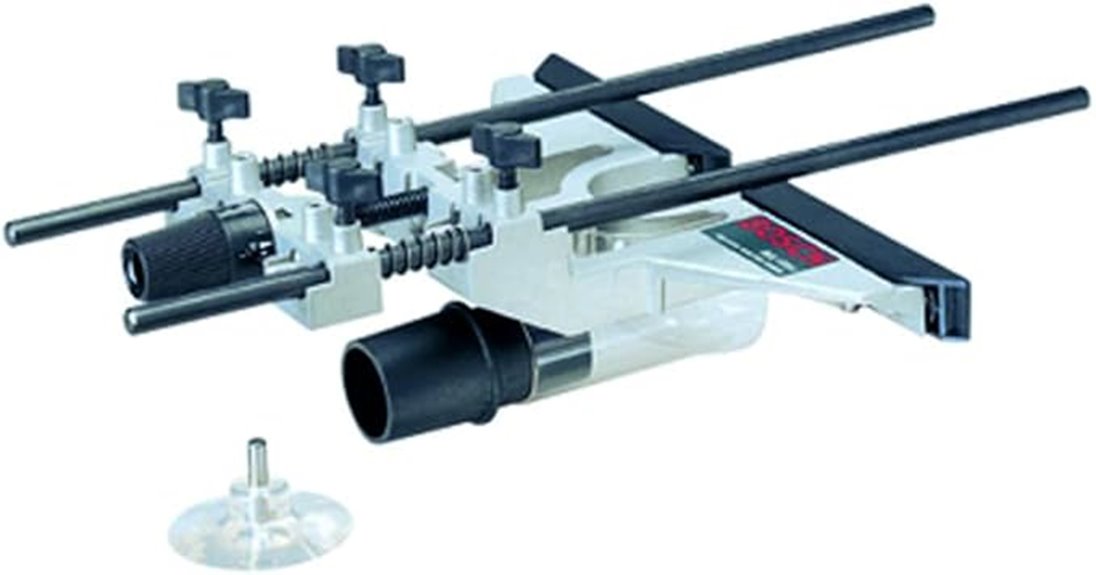
Crafting precision edges and creating smooth arcs is a breeze with the BOSCH RA1054 Deluxe Router Edge Guide with Dust Extraction Hood. This tool adapts seamlessly, converting into a circle guide for arcs up to 32 inches in diameter. I love how it’s compatible with most Bosch routers, allowing me to cut along the workpiece edge or up to 8 inches in. The precision fine-adjustment control enhances my accuracy, while the dust extraction hood keeps my workspace clean. With a solid rating from users, it’s a reliable addition to any woodworker’s toolkit. Just make sure to manage the dust collection setup!
Best For: The BOSCH RA1054 Deluxe Router Edge Guide is best for woodworkers and DIY enthusiasts seeking precision in edge forming and arc cutting.
Pros:
- Versatile Compatibility: Works with a wide range of Bosch router models, enhancing usability across different tools.
- Precision Control: Features fine-adjustment control for improved accuracy in cuts and edge formations.
- Effective Dust Management: Includes a dust extraction hood that helps maintain a clean workspace during use.
Cons:
- Cumbersome Dust Collection Setup: Some users find the dust collection setup to be time-consuming and less efficient.
- Bulkiness: The product’s size may require additional storage solutions, which could be inconvenient for some users.
- Potential for Operator Error: A few users have reported difficulties with adjustments, indicating a learning curve for optimal use.
TEENO Wood Router, 800W Compact Router Tools for Woodworking
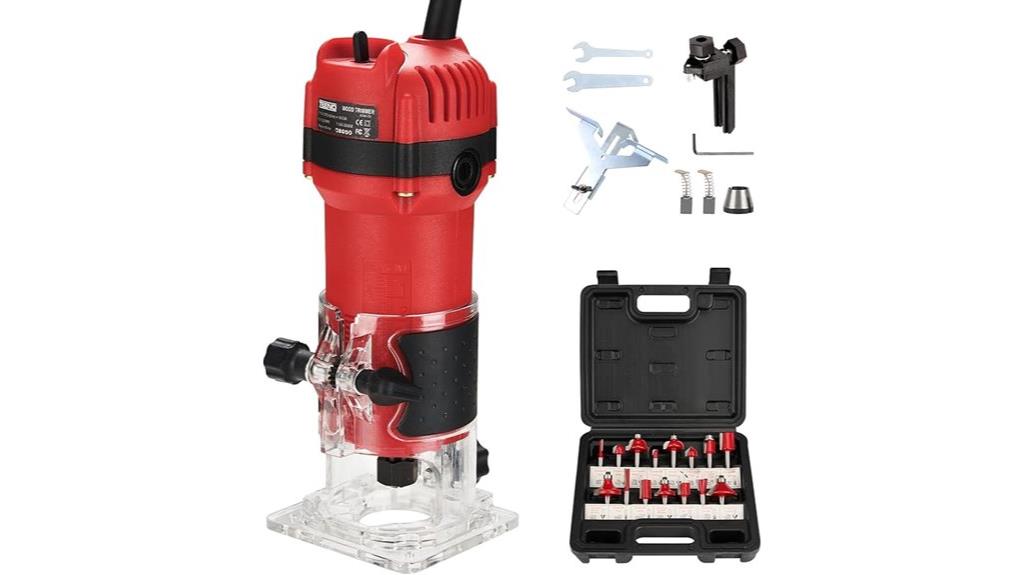
The TEENO Wood Router stands out as an ideal choice for beginners and hobbyists venturing into woodworking. With its powerful 800W motor and impressive 31,000 RPM speed, it efficiently handles various routing tasks. Weighing just 1.9 kg, it’s lightweight and easy to maneuver. The ergonomic design offers a rubber-covered base for a comfortable grip, while the transparent cover enhances visibility and dust control. It comes with 15 router bits and essential tools, making it a complete package. Though some users mention minor design issues, it’s still a solid option for those looking to create intricate wood projects.
Best For: The TEENO Wood Router is best for beginners and hobbyists who are looking to explore woodworking and tackle various routing tasks with ease.
Pros:
- Powerful 800W motor provides efficient performance for various routing applications.
- Lightweight design and ergonomic features enhance comfort and maneuverability during use.
- Comes complete with 15 router bits and essential tools, making it a comprehensive kit for woodworking projects.
Cons:
- Some users have reported minor design issues that may affect precision in routing.
- The quality of the user manual has been criticized, making it challenging for beginners to understand all features.
- A few customers experienced early malfunctions or performance inconsistencies with the tool.
Amana Tool Carbide Tipped Flush Trim Plunge Template
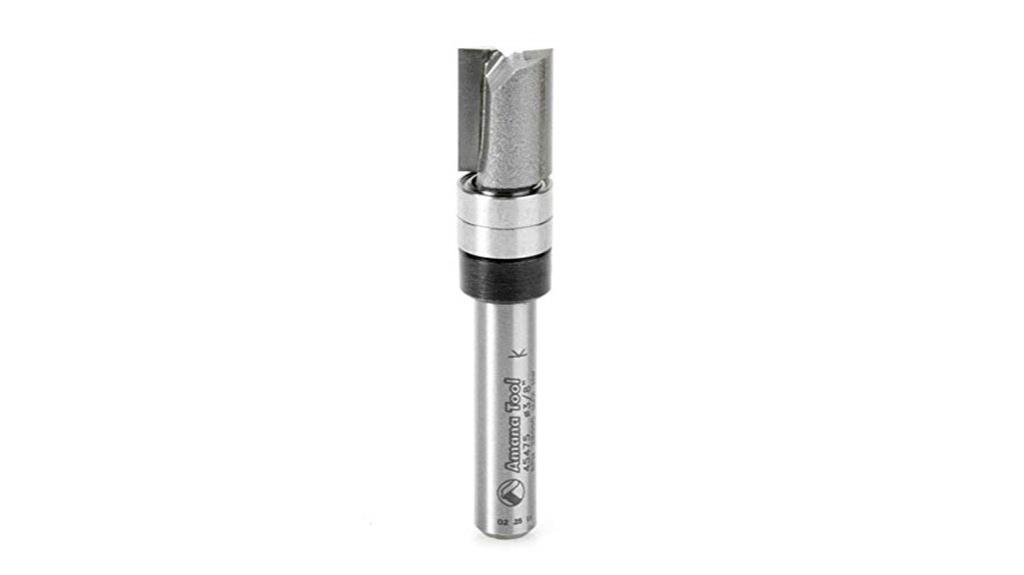
For woodworkers seeking precision in template routing, the Amana Tool Carbide Tipped Flush Trim Plunge Template stands out with its dual bearing design. This tool has a 3/8-inch diameter and a 1/2-inch cutting height, making it perfect for intricate designs. I love how the pilot bearing rides along the template edge, ensuring exact duplication of my workpiece. I’ve used it on maple and mahogany, and the smooth cuts are stunning. While some users note fragility, I’ve found it effective for shallow cuts. Though it’s a bit pricey, its quality makes it a worthwhile investment for detailed projects.
Best For: Woodworkers looking for precision and quality in template routing for intricate designs.
Pros:
- Highly effective for template/pattern routing with exact duplication of workpieces.
- Produces smooth cuts on various hardwoods like maple and mahogany, ideal for detailed projects.
- Durable carbide tipped design ensures longevity and sharpness over time.
Cons:
- Some users report fragility, with potential breakage during use if not handled carefully.
- The tool is considered expensive by some, which may deter budget-conscious buyers.
- Limited to shallow cuts to avoid breakage, which may not suit all project needs.
Newdeli Pattern Flush Trim Router Bit Set
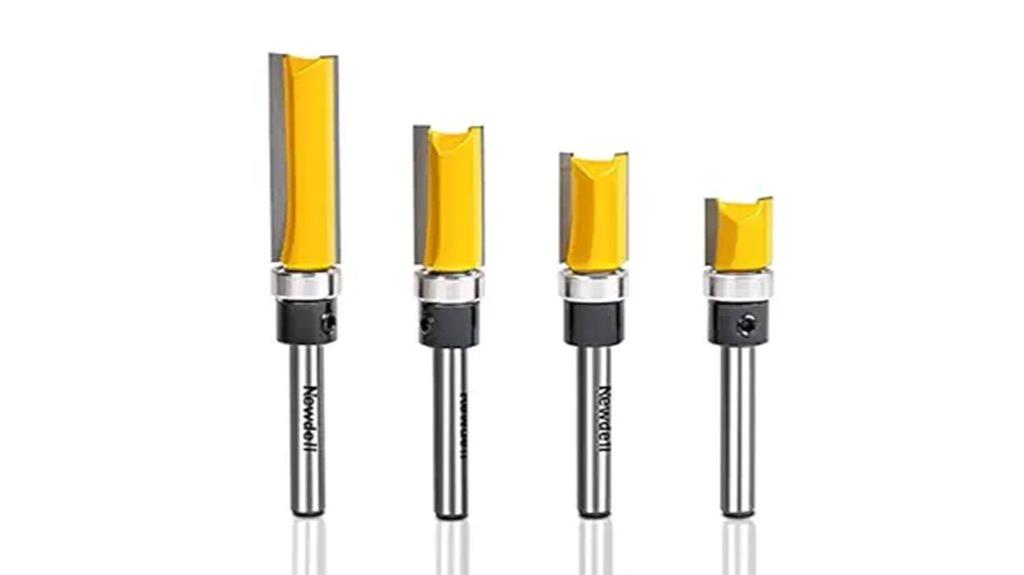
If you’re looking for a reliable and versatile router bit set, the Newdeli Pattern Flush Trim Router Bit Set might just be what you need. With a 1/4 inch shank and a cutting diameter of 1/2 inch, these bits are perfect for various projects. The heat-treated tungsten carbide blades are re-sharpenable, ensuring longevity. I appreciate the sealed bearings that deliver precise cuts while the 2-flute design helps with chip removal. Though some users have reported durability issues, I find it’s a solid choice for hobbyists. Just be cautious with heavy-duty applications, and consider investing in higher-quality brands for professional use.
Best For: The Newdeli Pattern Flush Trim Router Bit Set is best for hobbyists and DIY enthusiasts looking for a versatile and affordable router bit option.
Pros:
- Re-sharpenable heat-treated tungsten carbide blades ensure longevity and consistent performance.
- Sealed bearings provide uniform rotation for precise cutouts and smooth operation.
- 2-flute design aids in effective chip removal, resulting in clean cuts across various wood types.
Cons:
- Some users report durability issues, including bits breaking and bearing failures after limited use.
- Occasional tear-out can occur, necessitating patching in woodwork.
- May not be suitable for heavy-duty applications, making it less ideal for professional use.
FivePears 4 PCS Flush Trim Router Bits Set
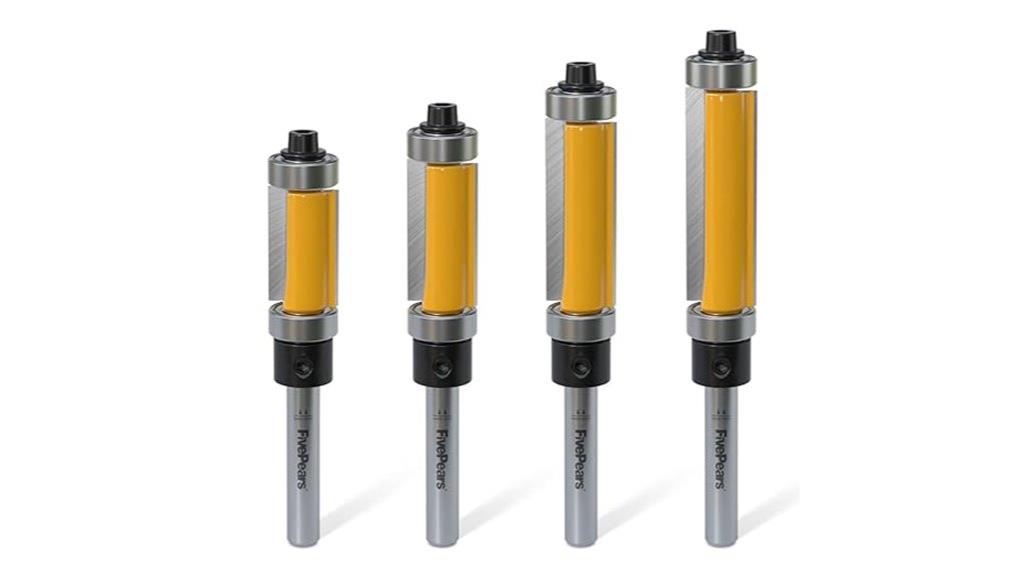
Engineered for precision, the FivePears 4 PCS Flush Trim Router Bits Set stands out as a must-have for both amateur and seasoned woodworkers. With a 1/4 inch shank and varying cutting lengths up to 1-1/2 inches, it adapts effortlessly to most projects. The high-quality carbide inserts deliver a smooth cutting experience, while the anti-kickback design enhances stability. I love how versatile these bits are—perfect for wood, MDF, and acrylic. Just remember to keep the RPM below 18,000 for peak performance. Customer feedback is overwhelmingly positive, making this set a reliable choice for elevating your woodworking game.
Best For: The FivePears 4 PCS Flush Trim Router Bits Set is best for both amateur and seasoned woodworkers looking for precision and versatility in their projects.
Pros:
- High-quality carbide inserts ensure smooth cutting and durability.
- Anti-kickback design enhances stability and reduces vibration during use.
- Versatile compatibility with various materials like wood, MDF, and acrylic.
Cons:
- Dull blades may pose safety hazards if not replaced timely.
- Not suitable for non-wood materials such as metal or iron.
- Recommended RPM limit may require slower operation for optimal performance.
Banding CMT Router Bits for Woodworking
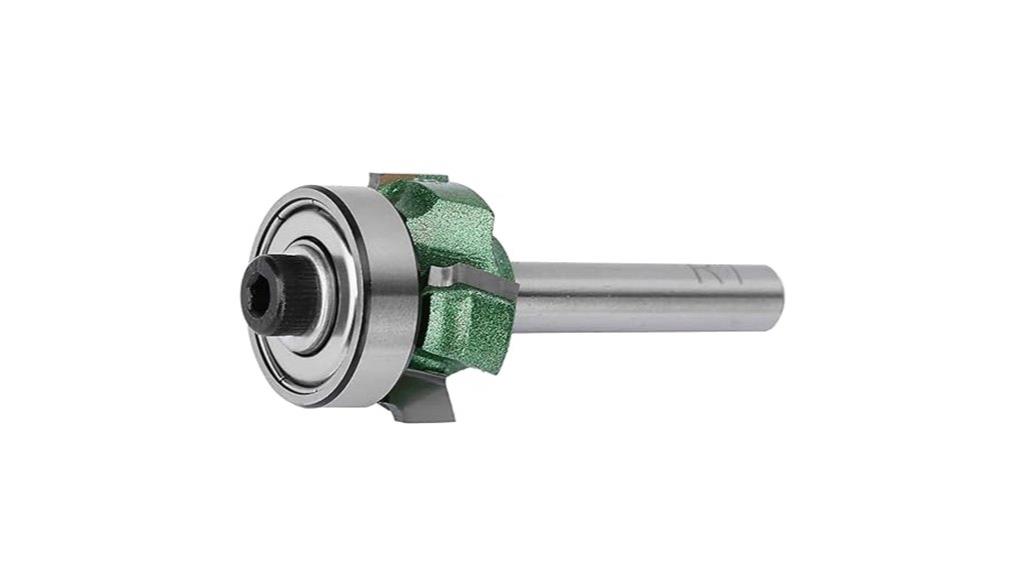
When it comes to achieving a flawlessly finished edge, the Banding Trimmer Router Bit from CMT stands out as an essential tool for woodworking enthusiasts and professionals alike. With models R1, R2, and R3, I can tackle various edge thicknesses with ease. The tungsten steel construction guarantees durability, while the four finely crafted teeth deliver smooth, rounded finishes. I appreciate the large bearing, which reduces burning during operation. Sure, the initial setup can be tricky, but once I get it dialed in, the results are impressive—minimizing sanding and leaving me with beautifully finished edges. It’s a game changer!
Best For: Woodworking enthusiasts and professionals looking for precise and beautifully finished edges on their projects.
Pros:
- High-quality tungsten steel construction ensures durability and longevity.
- Four finely crafted teeth provide smooth and rounded finishes, reducing the need for sanding.
- Large bearing design minimizes burning and allows for smooth operation.
Cons:
- Initial setup can be challenging for some users.
- Requires precise height adjustment, which may be time-consuming.
- Not suitable for gross trimming; best for final finishing work only.
Bosch 12V Max EC Brushless Palm Edge Router (Bare Tool) GKF12V-25N
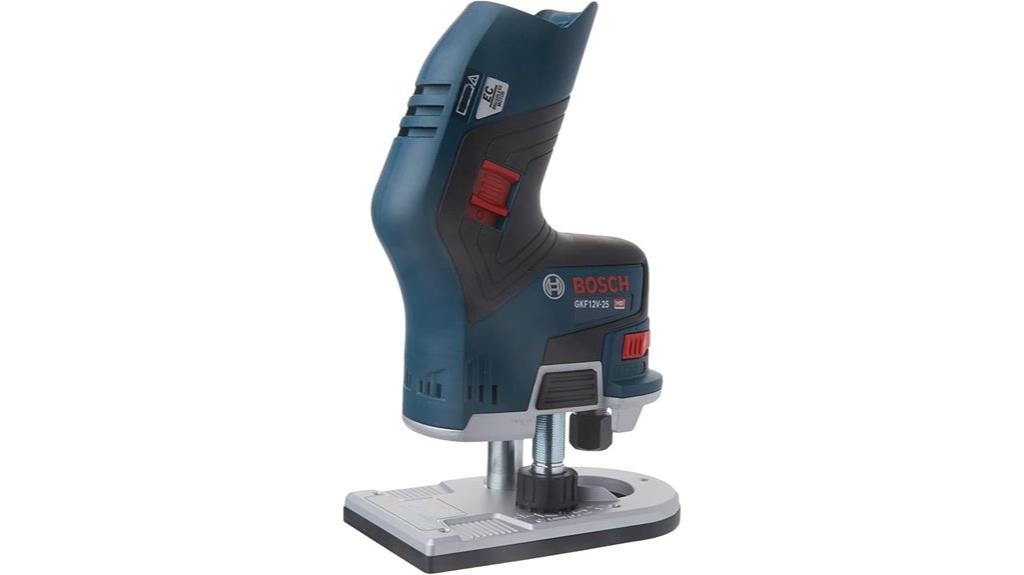
The Bosch 12V Max EC Brushless Palm Edge Router (Bare Tool) GKF12V-25N stands out as an exceptional choice for anyone seeking a lightweight and compact routing solution. Weighing just 2.2 lbs, it’s perfectly balanced for comfortable handling. With a powerful EC Brushless motor and a maximum speed of 13,000 RPM, I’ve found it excels at edge profiling and light round-overs. The fine and macro depth adjustments allow for precise routing. While it’s not meant for heavy-duty tasks, its user-friendly features, like the easy-change spindle lock, make it a joy to use for smaller projects. Highly recommended!
Best For: Those seeking a compact and lightweight router for precision edge profiling and light routing tasks.
Pros:
- Lightweight design (2.2 lbs) for easy handling and maneuverability.
- EC Brushless motor delivers efficient power with a maximum speed of 13,000 RPM.
- User-friendly features like easy-change spindle lock and fine depth adjustments enhance usability.
Cons:
- Battery power may limit performance on larger projects.
- Some users report longer recharge times for batteries.
- Not suitable for heavy-duty routing tasks compared to larger routers.
SILVEL Wood Router 800W for Woodworking
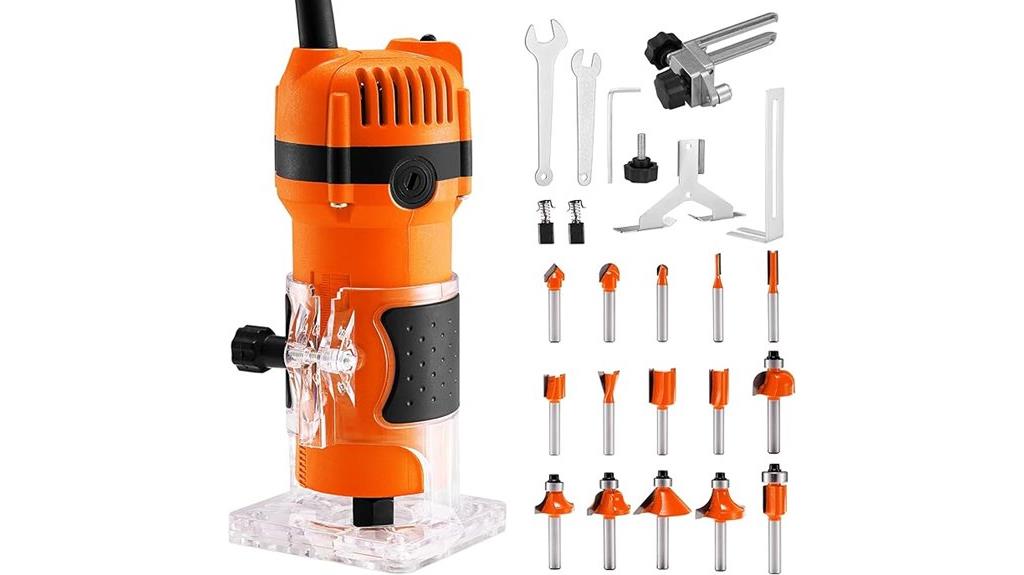
For anyone looking to dip their toes into woodworking without breaking the bank, the SILVEL Wood Router 800W is an excellent choice. With a powerful 800W motor, it’s compact and easy to handle, making it ideal for small jobs. I’ve found it performs well on various materials, though it can struggle with soft pine. The included 15 1/4 router bit set adds great value, despite some users reporting quick breakages. While the manual could use improvement, many can navigate without it. Overall, it’s perfect for beginners wanting a reliable, budget-friendly router for quick projects.
Best For: Beginners and casual users looking for an affordable and compact router for small woodworking projects.
Pros:
- Affordable pricing, making it a great value for budget-conscious users.
- Compact design and easy operation, suitable for quick projects.
- Includes a 15 1/4 router bit set that adds value to the purchase.
Cons:
- Mixed reviews on the quality of router bits, with some users experiencing breakages quickly.
- Usability of provided wrenches is reported to be poor.
- The manual is considered poorly translated and lacking in helpfulness.
4PCS Pattern Flush Trim Router Bits Set

Crafted specifically for woodworking enthusiasts, the 4PCS Pattern Flush Trim Router Bits Set stands out with its versatile cutting lengths of 3/8, 3/4, 1, and 1-1/2 inches. Made from durable alloy steel with a heat-resistant Teflon coating, these bits feature C3 micro-grain tungsten carbide blades that offer exceptional strength and an anti-kickback design for safety. I’ve found them perfect for flush trimming templates across various materials like wood, MDF, and laminate. While they perform well, keep an eye on their sharpness with medium hardwoods. Overall, they elevate my woodworking projects with clean, smooth cuts every time.
Best For: Woodworking enthusiasts looking for reliable and versatile flush trim router bits for various materials.
Pros:
- Durable construction with heat-resistant Teflon coating and C3 micro-grain tungsten carbide blades.
- Smooth cuts with minimal vibration, ensuring clean finishes on woodworking projects.
- Suitable for a range of materials including wood, MDF, laminate, and acrylic.
Cons:
- May experience rapid dulling when used on medium hardwoods.
- Requires multiple passes for finer finishes on tougher materials.
- Not compatible with metal or non-wood materials, limiting versatility.
Milescraft 1224 Edge & Mortise Guide
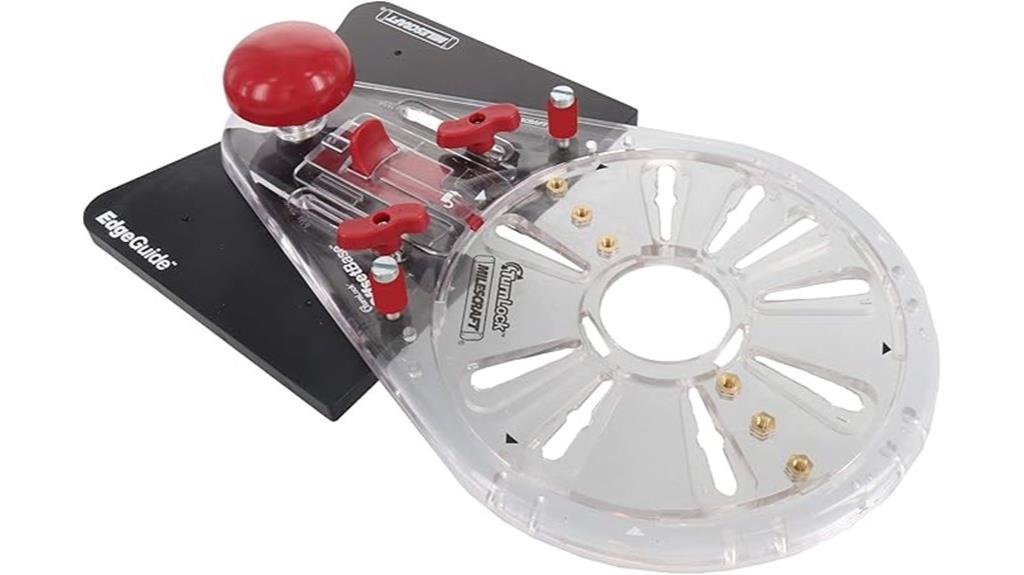
Designed with versatility in mind, the Milescraft 1224 Edge & Mortise Guide is perfect for woodworkers tackling mortises, dados, and edge finishing. I’ve found the large surface area really helps when working on both straight and curved edges. Its offset base is a game-changer for narrow boards. I appreciate the included non-marring pins for different board thicknesses, making setup a breeze. While it glides smoothly and offers great control, I recommend it mainly for occasional use. For daily projects, a sturdier option might be better. Overall, it’s an excellent choice for beginners looking to elevate their woodworking skills!
Best For: The Milescraft 1224 Edge & Mortise Guide is best for beginners and occasional woodworkers looking to enhance their skills in mortising and edge finishing.
Pros:
- Large surface area enhances control for both straight and curved edges.
- Offset base allows for effective use on narrow boards.
- Includes non-marring pins for easy setup with varying board thicknesses.
Cons:
- May not be sturdy enough for daily use, as some users prefer heavier options.
- Initial setup can be tricky for some users.
- The plastic material may experience cracks due to manufacturing issues.
Yakamoz 4Pcs 1/4 Inch Shank Chamfer Router Bit Set
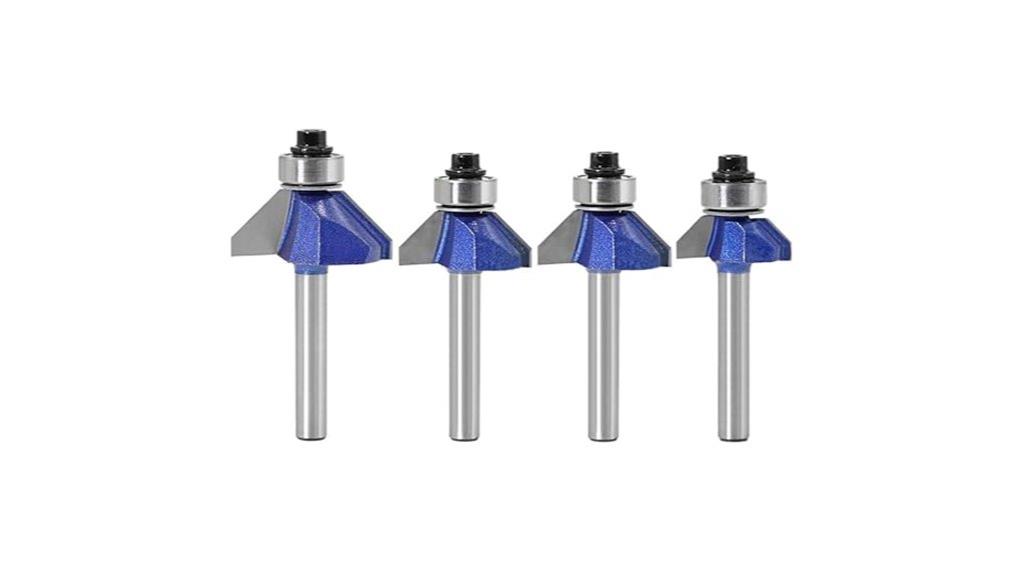
The Yakamoz 4Pcs 1/4 Inch Shank Chamfer Router Bit Set stands out for its versatility, making it an ideal choice for hobbyists and DIY enthusiasts alike. With its 45° chamfer angle and various bevel cutting lengths, it effortlessly adds clean, beveled edges to projects. Crafted from premium C3 micro-grain tungsten carbide, these bits maintain sharpness over time, ensuring reliable performance on materials like MDF and solid wood. Users appreciate their compatibility with different routers and the value they offer. Despite minor imperfections noted by some, these bits deliver excellent results, making them a smart addition to any woodworking toolkit.
Best For: Hobbyists and DIY enthusiasts looking for reliable and affordable router bits for woodworking projects.
Pros:
- Versatile chamfer angles allow for clean beveled edges on various materials.
- Made from premium C3 micro-grain tungsten carbide, ensuring long-lasting sharpness.
- Compatible with multiple router types, making it suitable for different woodworking setups.
Cons:
- Some users reported minor imperfections in carbide grinding, leading to tiny scratches.
- Not designed for heavy industrial use, which may limit its appeal for professional woodworkers.
- Smaller sizes may be hard to find in local stores, necessitating online purchases.
Factors to Consider When Choosing Router Tools for Edges
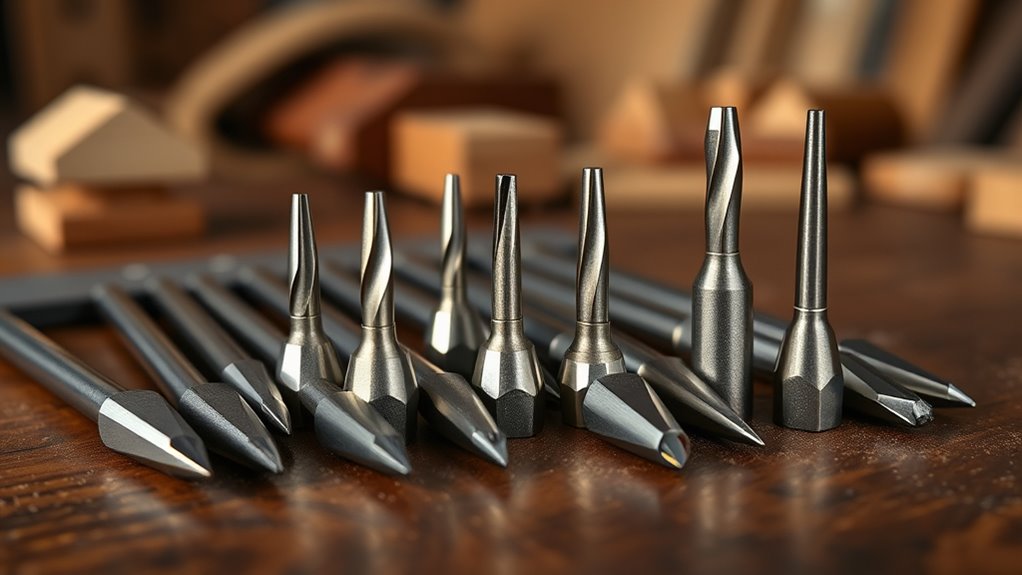
When choosing router tools for edges, I always consider several key factors. The type of router, motor power, and compatibility with bits can really affect my results. Plus, features like speed control and ergonomic design make a big difference in how comfortable and effective my work is.
Router Type Selection
Choosing the right router type can make all the difference in your woodworking projects. I recommend considering whether a fixed base or plunge router fits your needs. Fixed base routers offer stability for edge work, while plunge routers provide versatility for intricate cuts. It’s also essential to check the router’s compatibility with various bit sizes, ensuring it can handle both 1/4 inch and 1/2 inch shank bits. Ergonomic design features, like rubber-covered handles and lightweight bodies, can enhance comfort during prolonged use. Additionally, look for routers with reliable depth adjustment mechanisms, such as rack-and-pinion systems or tool-free adjustments, so you can control cutting depth precisely for edge forming and finishing tasks.
Motor Power Considerations
Finding the right router type sets the stage for understanding motor power considerations. The motor power, measured in amps or horsepower, greatly affects your router’s cutting performance. I’ve found that a router with at least 6.5 amps can handle demanding tasks like edge forming effectively. Variable speed control is another feature I appreciate; it allows me to adjust the RPMs, maximizing precision for fine cuts or heavier work. When selecting a router, consider its weight too—lighter models are easier to maneuver, while heavier ones offer more stability. Ultimately, it’s essential to match the motor power to your intended application. Using an underpowered router for heavy-duty tasks can lead to overheating and decreased performance, which I’ve experienced firsthand.
Bit Compatibility Importance
Understanding bit compatibility is essential for achieving the best results in woodworking, especially when you’re working with different router tools. I always check the shank sizes—whether they’re 1/4 inch or 1/2 inch—because using the wrong size can compromise the fit and functionality. It’s also critical to verify the router bits are designed for the material I’m using, like wood or MDF, since this can greatly impact the quality of cuts. Some bits, like flush trim bits, require specific bearing sizes, adding another layer of importance to compatibility. I’ve learned that using incompatible bits can lead to poor performance and safety hazards, so I always confirm compatibility before starting my projects.
Speed Control Features
After ensuring bit compatibility, I turn my attention to speed control features when selecting router tools for edge work. Having the ability to adjust the rotational speed is vital, with typical ranges from 10,000 to 32,000 RPM. This versatility allows me to tailor the speed for different materials and tasks, preventing issues like burning or damaging softer woods. I appreciate routers with smooth acceleration and deceleration, which help maintain stability and lead to cleaner cuts. Variable speed settings, especially those with a dial for fine-tuning, empower me to achieve ideal performance for intricate designs. Understanding a motor’s maximum speed is important too, as higher RPMs are perfect for edge trimming and fine routing tasks.
Ergonomic Design Benefits
While I’m focused on achieving precision in my woodworking projects, I can’t overlook the importance of ergonomic design in router tools. Rubber-covered handles provide a comfortable grip, which I appreciate during long sessions, as they considerably reduce hand fatigue. A well-balanced and lightweight router enhances my maneuverability, allowing me to control movements with precision. I also love that many ergonomic routers have easy-to-reach controls for quick adjustments, so I don’t interrupt my workflow. The anti-vibration features guarantee smoother operation, increasing accuracy and minimizing errors while working on edges. Plus, these tools cater to various hand sizes, making them easier to handle and reducing strain. This thoughtful design truly elevates my woodworking experience.
Dust Management Solutions
When I’m working on edge routing, effective dust management solutions are essential for maintaining a clean and safe workspace. I’ve found that using dust extraction hoods and vacuum hose adapters can greatly improve cleanliness by capturing debris right at the source. Many routers come with integrated dust collection features, which enhance visibility and safety while I’m working. Adopting a solid dust management system not only improves air quality but also reduces respiratory hazards from fine wood dust. Plus, keeping my workspace clear helps prolong the lifespan of my router bits by preventing debris buildup that can affect performance. Ultimately, proper dust management boosts my overall project efficiency, letting me focus more on routing tasks and less on cleanup.
Weight and Portability
Choosing the right router tool for edge work hinges greatly on weight and portability. I’ve found that lighter tools, typically between 4 to 6 pounds, make a world of difference in usability. They enhance portability and notably reduce fatigue during extended sessions. The design and weight distribution also impact balance and control, which are essential for precision routing. When I need to transport my router between job sites, a compact design is a bonus, especially since I often work without a dedicated space. While heavier models can offer more stability for aggressive routing, I prefer lighter options for their versatility and ease of handling—perfect for intricate designs and detailed edge work.
Price vs. Performance
Finding the right balance between price and performance in router tools for edge work is essential, especially if you want to achieve high-quality results without breaking the bank. While budget-friendly routers and bits can work well for occasional DIY projects, I’ve often found that investing in higher-end models pays off in durability and precision. Premium tools usually offer advanced features like variable speed control, greatly improving performance. Plus, lower-cost bits tend to dull quickly, requiring frequent replacements that can add up. So, consider your needs—if you’re a professional or serious hobbyist, it’s wise to invest in tools that’ll stand the test of time, ensuring you get the best results for your woodworking projects.
Frequently Asked Questions
What Safety Gear Should I Wear While Using Router Tools?
When I use router tools, I always prioritize safety gear. I wear safety goggles to protect my eyes from flying debris, and I use ear protection to guard against the loud noise. A dust mask helps filter out harmful dust particles, and I make sure to wear gloves for a better grip and added protection. It’s vital to stay safe while enjoying woodworking, so I never skip this essential gear!
How Do I Maintain My Router Tools for Longevity?
Keeping my router tools in tip-top shape is like giving them a little spa day. I always start by cleaning the bits and base after each use to prevent gunk buildup. Regularly checking for any wear and tear helps me catch issues early. I also keep the motor lubricated and store them in a dry place. By treating my tools with care, I guarantee they’ll stick around for many projects to come.
Can I Use Router Tools on Different Types of Wood?
Absolutely, I use router tools on various types of wood all the time! They work great on softwoods like pine and hardwoods like oak. However, I’ve learned that different woods can affect the finishing process. Softer woods might tear out more easily, while harder woods require sharper bits. I always adjust my technique and speed based on the material to get the best results. Don’t hesitate to experiment; it’s part of the fun!
What Is the Difference Between a Plunge Router and a Fixed-Base Router?
When I compare a plunge router to a fixed-base router, it’s like choosing between a sports car and a reliable sedan. The plunge router lets me dive right into my material, adjusting depth on the fly, while the fixed-base router offers stability, perfect for edge work. I love how each serves unique purposes; I often reach for the plunge router for intricate cuts and the fixed-base for consistent, clean edges. Choices matter!
Are There Any Beginner Tips for Using a Router Effectively?
When I first started using a router, I found a few beginner tips really helpful. Always read the manual to understand your specific model. Start with simple projects to build confidence, and practice on scrap wood before tackling your main piece. I also recommend using clamps to secure your workpiece, ensuring safety and stability. Finally, take your time—don’t rush the process, as precision is key to achieving clean, professional results.
Conclusion
In the world of woodworking, choosing the right router tools is like finding the perfect brush for a masterpiece. Each tool can shape your projects and elevate your skills, so take your time to select what suits you best. Whether you’re carving edges or trimming patterns, investing in quality tools will pay off in every cut you make. So, gear up and let your creativity flow – your next woodworking project is waiting to be crafted!
